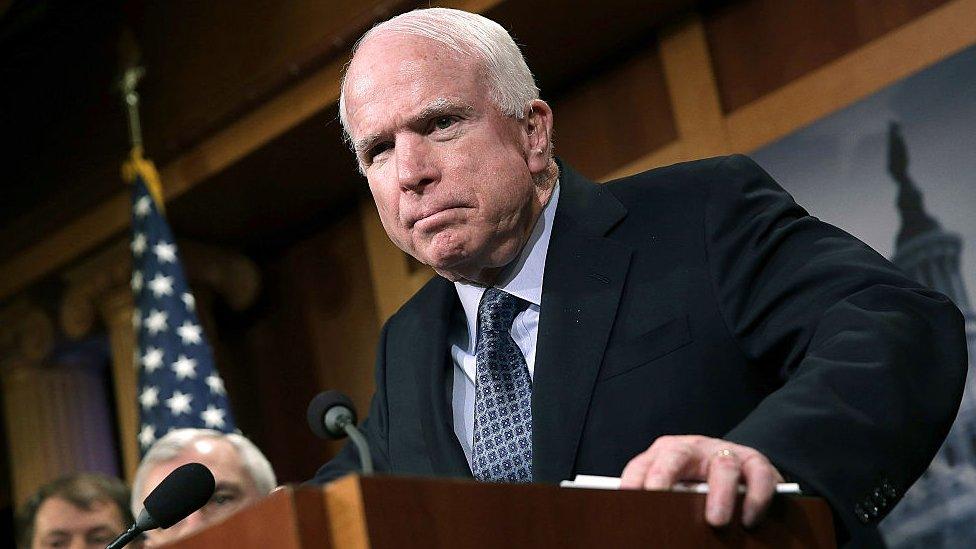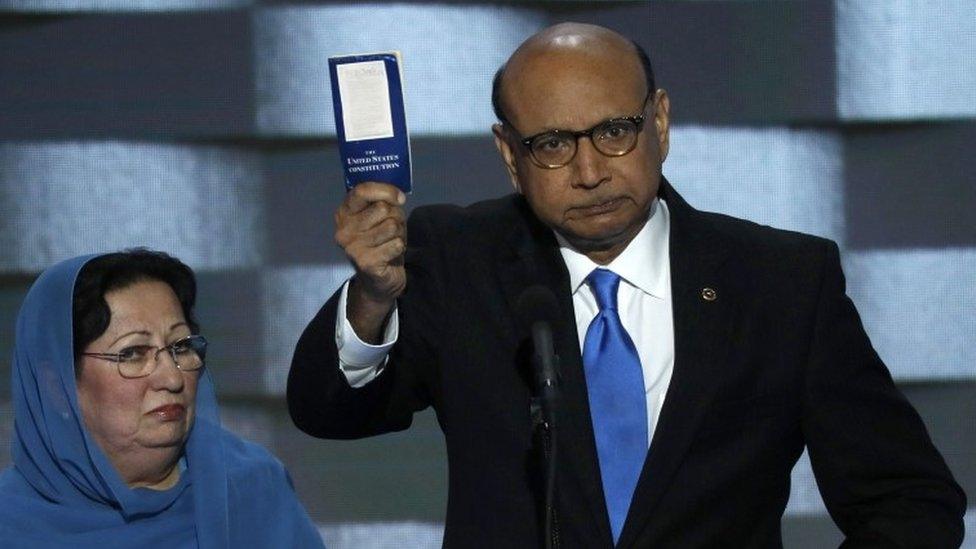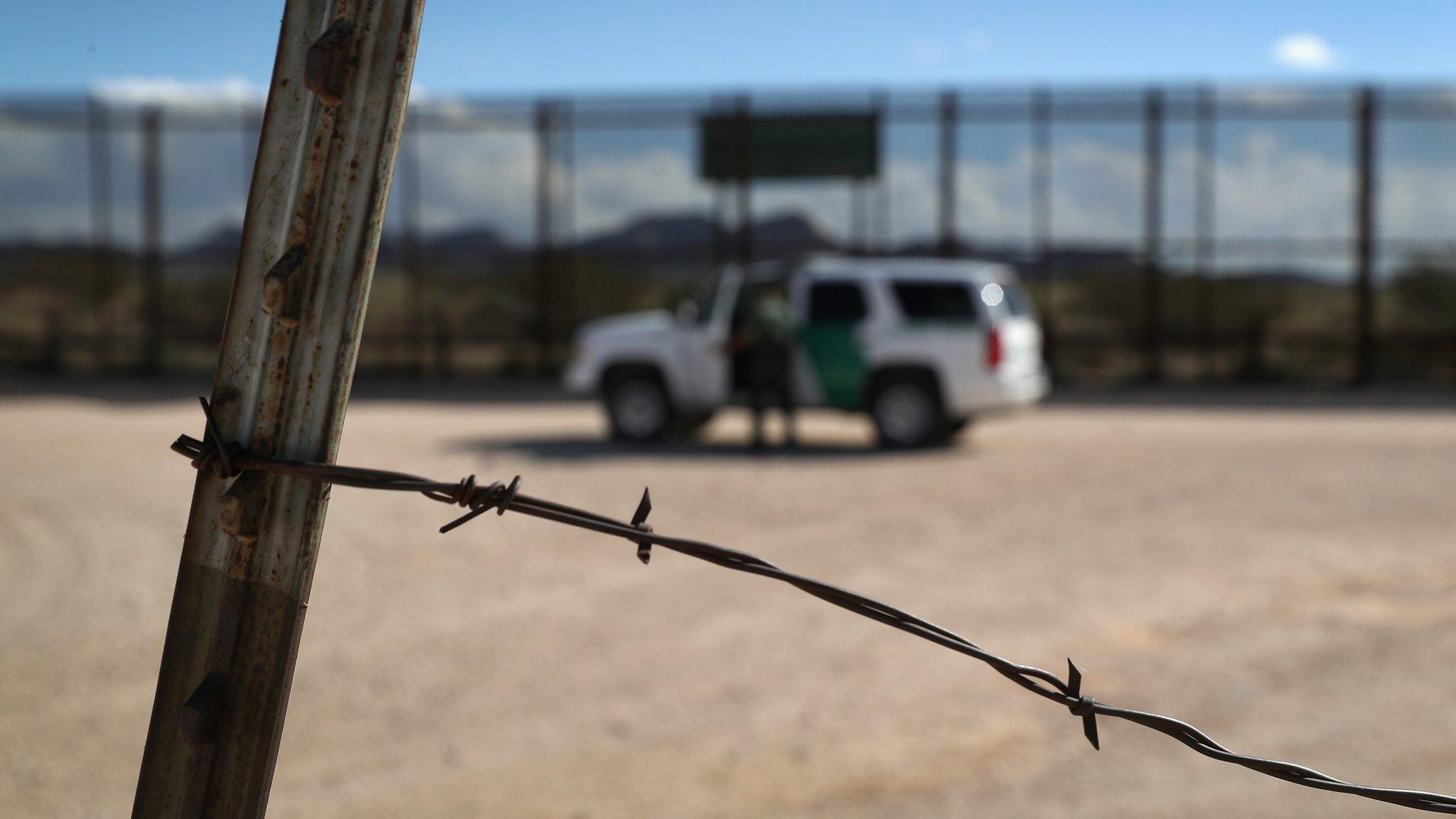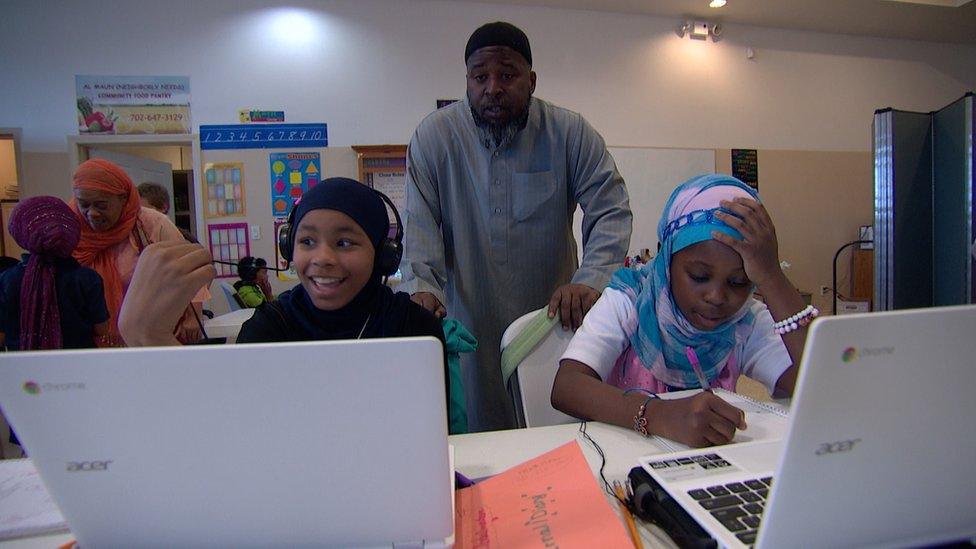Mother of US Muslim soldier hits back at Trump over speech silence
- Published
Donald Trump speaking to ABC: "She was standing there, she had nothing to say"
The mother of a dead US Muslim soldier has hit back at presidential hopeful Donald Trump for questioning her silence during a speech by her husband.
Ghazala Khan said Mr Trump was ignorant about Islam and that he did not know the meaning of the word sacrifice.
Her husband Khizr Khan attacked the Republican nominee in an emotional speech to the Democratic National Convention on Thursday.
Mr Trump later suggested Mrs Khan may not have been allowed to speak.
The couple's son, US Army Capt Humayun Khan, was killed by a car bomb in 2004 in Iraq at the age of 27.
In an opinion article for the Washington Post, external, Mrs Khan said her husband had asked her if she wanted to speak at the convention but she had been too upset.
Ghazala Khan: "All America felt my pain... please Mr Trump, feel that pain"
"Walking on to the convention stage, with a huge picture of my son behind me, I could hardly control myself. What mother could? Donald Trump has children whom he loves. Does he really need to wonder why I did not speak?" she wrote.
She added: "Donald Trump said he has made a lot of sacrifices. He doesn't know what the word sacrifice means."
On Monday, family members of eleven service-members killed in action wrote to Mr Trump, expressing dismay at his treatment of the family of Humayun Khan, and demanding an apology.
"When you question a mother's pain, by implying that her religion, not her grief, kept her from addressing an arena of people, you are attacking us. When you say your job building buildings is akin to our sacrifice, you are attacking our sacrifice," their letter said.
"This goes beyond politics. It is about a sense of decency. That kind decency you mock as 'political correctness'," it went on to say.
Mr Trump's running mate, Governor Mike Pence, released a statement , externalon Sunday avoiding the criticism of the family and saying he and Mr Trump both believed Captain Khan was an American hero.
However, Mr Trump took to Twitter, external on Monday to criticise the Khans for appearing on television, adding , externalthat the story was not about Khizr Khan, but rather "radical Islamic terrorism" and the US.

Analysis: Anthony Zurcher, BBC North America Reporter
Khizr Khan: "You have sacrificed nothing - and no one!"
There simply is no way for a politician to get into a war of words with the parents of a soldier who died a hero on the battlefield and not come off looking bad.
That didn't stop Donald Trump from making a very inelegant go of it.
By raising questions about why Ghazala Khan was silent as her husband spoke at the Democratic National Convention on Thursday, he essentially dared her to step forward.
She did.
Mr Trump has survived - even thrived - after controversial statements in the past and it's become clear that the New Yorker has a core of support that won't abandon him.
Now the nominees are entering the heat of the general election and Mr Trump needs to expand his base if he wants to win. Disputes like this will make that an extremely difficult task.

As some Democratic lawmakers called on Republicans to disavow Mr Trump, the party's leadership spoke out against the confrontation.
On Monday, Arizona Senator John McCain denounced Mr Trump, saying he was "morally bound to speak only to the things that command my allegiance", which included the Republican Party and the US.
"I cannot emphasize enough how deeply I disagree with Mr. Trump's statement. I hope Americans understand that the remarks do not represent the views of our Republican Party, its officers, or candidates," he said in a statement.
Mr McCain went on to thank the Khan family for immigrating to America, adding "we're a better country because of you."

Mr Trump's "remarks do not represent the views of our Republican Party, its officers, or candidates," Mr McCain said
Last year Mr Trump came under fire after he said Mr McCain, the 2008 Republican presidential nominee, was not a war hero because he was captured in Vietnam.
Senate Majority Leader Mitch McConnell and House Speaker Paul Ryan had also condemned any criticism of Muslim Americans who serve their country.
Both also rejected the idea of a Muslim travel ban, an idea proposed the Republican presidential candidate earlier in the campaign.
But neither statement mentioned Mr Trump by name or criticised him.
At the convention in Philadelphia, Pakistani-born Khizr Khan said his son would not even have been in America if it had been up to Mr Trump, who has called for a ban on Muslims entering the US.
Responding to the criticism, Mr Trump said in an interview with ABC's This Week, external: "If you look at his wife, she was standing there.
"She had nothing to say... Maybe she wasn't allowed to have anything to say. You tell me."
Mr Trump also defended himself from Mr Khan's criticism.
"While I feel deeply for the loss of his son, Mr Khan, who has never met me, has no right to stand in front of millions of people and claim I have never read the Constitution, (which is false) and say many other inaccurate things," he said.
But Mr Trump's remarks drew condemnation from both Democrats and Republicans.
Democratic presidential candidate Hillary Clinton attacked Trump's treatment of the Khans during a campaign stop at a church in Cleveland, Ohio.
"Mr. Khan paid the ultimate sacrifice in his family, didn't he?" she told the African American congregation.
"And what has he heard from Donald Trump? Nothing but insults, degrading comments about Muslims, a total misunderstanding of what made our country great - religious freedom, religious liberty," she said.

How many Muslims are there in the US?
Pew Research Center's 2014 Religious Landscape Study found that 0.9% of US adults identify as Muslims.
A 2011 survey of Muslim Americans, estimated that there were 1.8 million Muslim adults (and 2.75 million Muslims of all ages) in the country. That survey also found that a majority of US Muslims (63%) are immigrants.
Demographic projections estimate that Muslims will make up 2.1% of the US population by the year 2050, surpassing people who identify as Jewish on the basis of religion as the second-largest faith group in the country (not including people who say they have no religion).
A Pew Research Center report estimated that the Muslim share of immigrants granted permanent residency status (green cards) increased from about 5% in 1992 to roughly 10% in 2012, representing about 100,000 immigrants in that year.
Source: Pew Research Center, external

- Published29 July 2016

- Published28 July 2016
- Published9 November 2016

- Published15 December 2015
